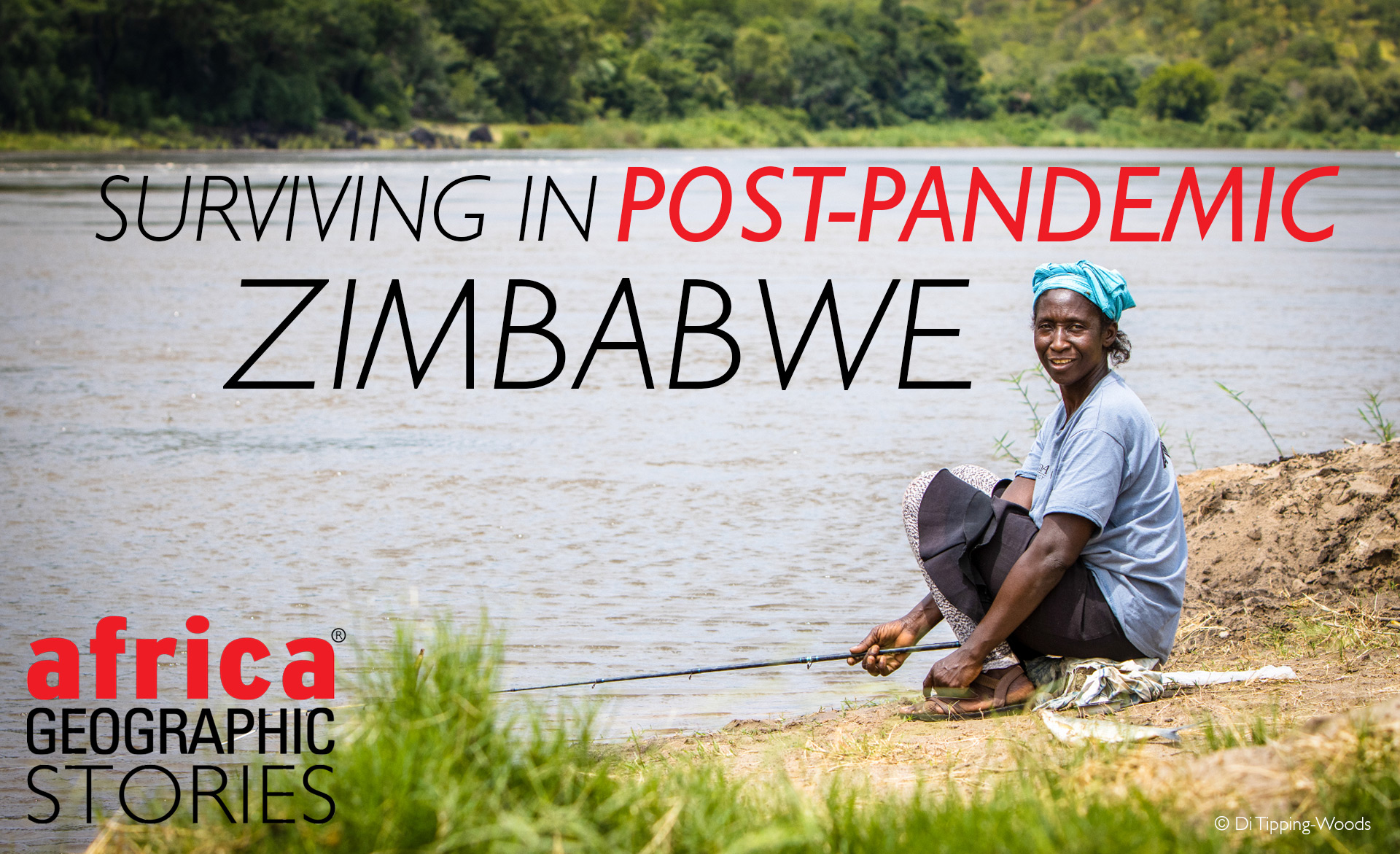
Even as tourism recovers, hunger stalks Zimbabwe
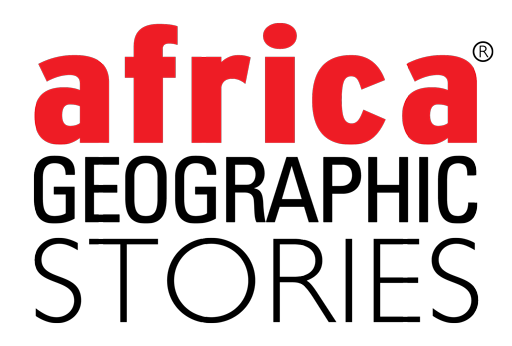

Rose Tshuma is fishing from the eastern bank of the Zambezi River, just in front of the Sidinda Fishing Camp in Zimbabwe, where she works as a housekeeper. “Look across at that crocodile. We’re all hungry,” she says as her eyes follow the stealthy hunter patrolling the opposite shore. The 52-year-old has a wry sense of humour and a keen awareness of the realities of rural life in this part of Zimbabwe. She knows from experience that hunger is no joke.
About eighty kilometres upstream, the mighty Zambezi River plunges more than one hundred meters down the famous Mosi-Oa-Tunya (The Smoke that Thunders), the Lozi name for Victoria Falls, a UNESCO World Heritage Site. It pushes on through constricting gorges offering some of the world’s best white-water rafting to this calmer stretch of river: prime game fishing territory for species like feisty tigerfish and vundu, the largest freshwater species in southern Africa. The river then winds its way towards Kariba Dam, Mozambique, and the Indian Ocean.
When tourism suffers
Tourism has always been vital to Zimbabwe’s economy, and in 2019, it contributed a total of 5.8% to the country’s GDP and 8.6% of the total employment. The town of Victoria Falls is an international tourism hub surrounded by national parks and game management areas, including Zambezi National Park and the vast Hwange National Park.
But as Tshuma notes, even here, things are hard. So, working with local partners, the African Nature-Based Tourism Platform gathered data on the effects of the pandemic on tourism businesses in 11 African countries, including Zimbabwe, to identify the hardest-hit communities and enterprises and their most pressing needs. The platform was launched in April 2021 with $1.9 million from the Global Environment Facility (GEF) and is working with local partners in 11 countries, including Zimbabwe, to mobilise at least US$15 million to benefit the most vulnerable.
The eighty enterprises surveyed in Zimbabwe indicated almost 1 in 3 people employed in the tourism value chain had lost their job due to the pandemic. Tshuma’s colleague, tracker Sylvester Ndlovu, has been out of work for nearly two years, while others are on reduced pay as tourism businesses in the area haven’t been able to pay their employees a full salary, given the lack of bookings. Ndlovu sold some of his goats for about US$30 each and used the remaining herd for meat and milk. Others have sold hard-earned vehicles and assets to put food on the table.
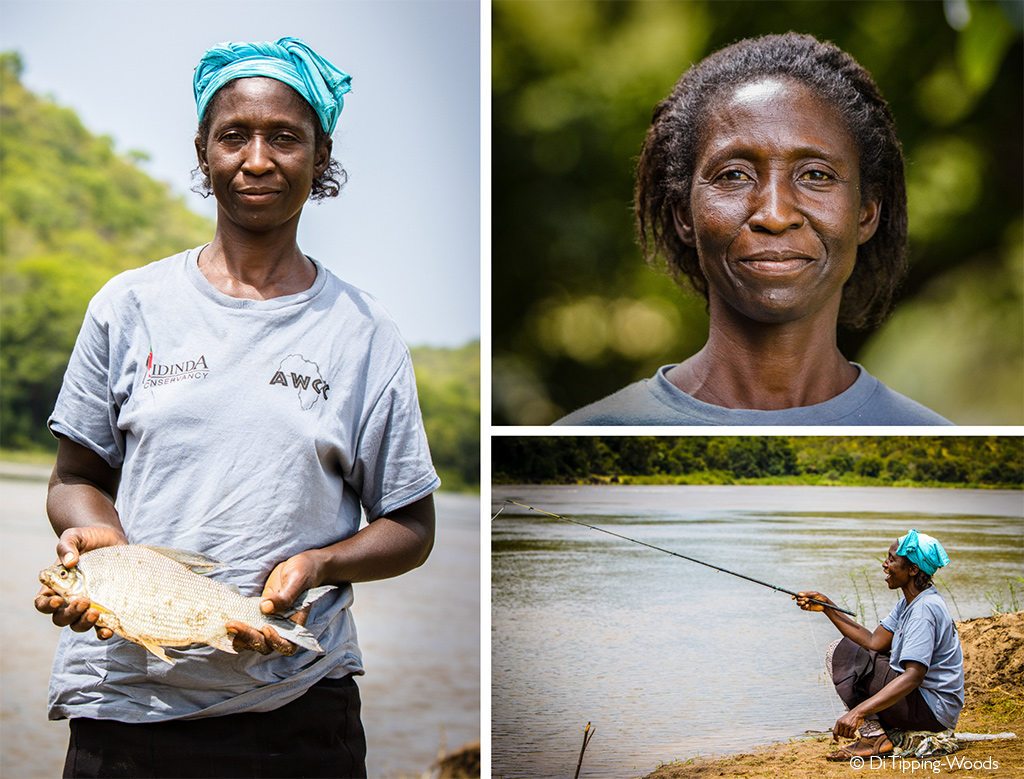
As in Zimbabwe, tourism workers all around southern Africa are facing similar challenges, as COVID-19-related bans have strangled international travel, leaving tourism-reliant communities searching for new opportunities. And without the salaries, service fees, tips, and gratuities that supplement rural tourism-dependent livelihoods, the hardest hit people are harvesting wild fruits or snaring animals to survive.
As one of few still employed in the sector, Tshuma will get a modest salary and rations like maize meal, rice, oil, and salt at the end of the month, plus the fish she catches. “I know what it’s like to live off wild fruits,” she says, pointing to the hard, fibrous ilala palm nuts that grow close to the river. “I have eaten those in drought years.” She anticipates challenging months ahead, as many villages in Zimbabwe’s Hwange District already rely on food aid from The World Food Programme.
In 2020 The Zimbabwe Vulnerability Assessment Committee (ZimVAC) estimated that 7.7 million Zimbabweans (5.5 million in rural areas) would experience food insecurity at the peak of the lean season, exacerbated by drought, economic uncertainty, and the COVID-19 pandemic. 2022 doesn’t look much better. A prolonged dry spell followed the early rains, and showers in March and April have come too late for the wilting crops in nearby fields.
Sharing space and resources
The storms have also turned the river brown overnight, and Tshuma isn’t optimistic about her chances today, as the local fish she likes to catch to eat – bream and chessa – favour clear water. When a herd of buffalo comes down to drink late afternoon, she reels in one last time. There are no guests in camp, but she still has chores. The property needs to be maintained for when travel resumes. “I am optimistic people will come back. We must survive until then,” she says.
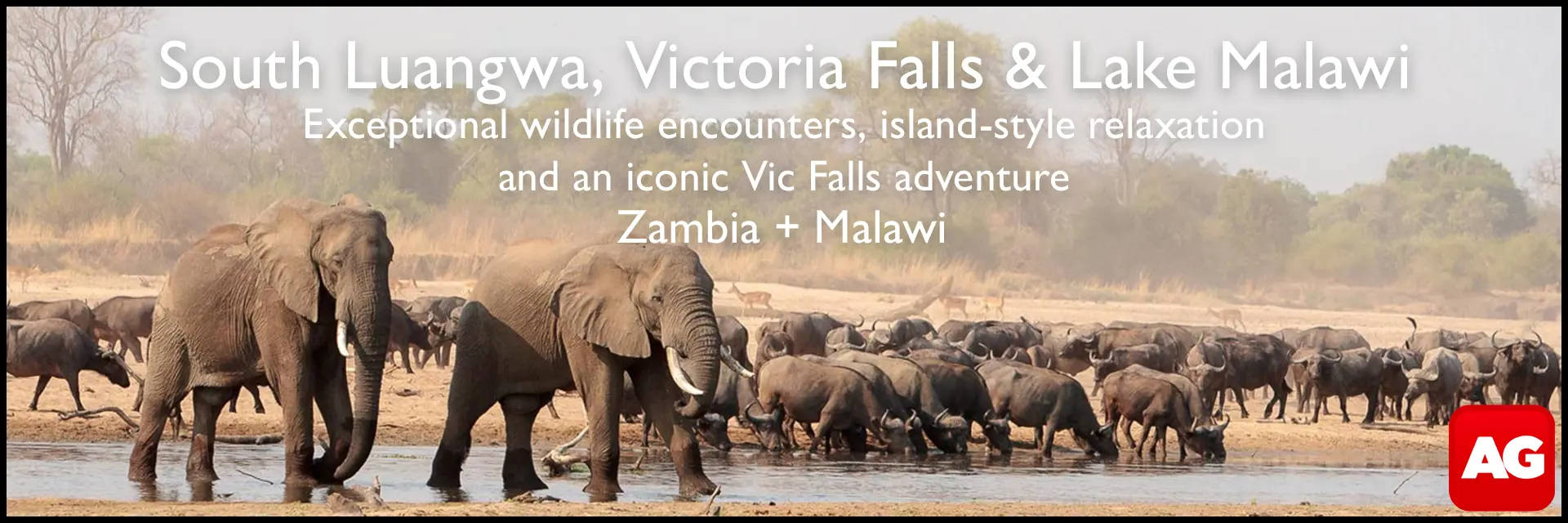
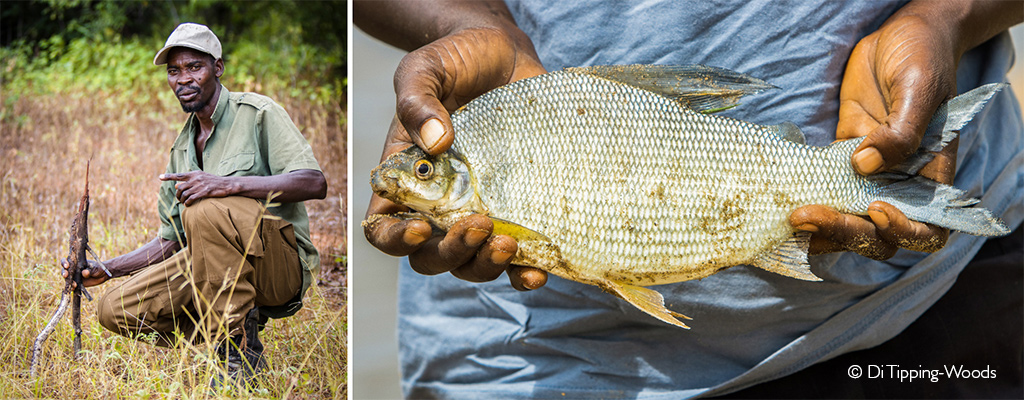
Without tourism-related jobs, income, and meat from hunting, conservation isn’t an easy sell to villagers living in this important wildlife corridor in the Kavango Zambezi Transfrontier Conservation Area.
The web of interdependence between people and wildlife can be as muddy as the river after the rain. Years of drought, overgrazing, livestock diseases, and human-wildlife conflict have put pressure on natural resources in an area that includes Hwange National Park, Zambezi National Park, Victoria Falls National Park, and dozens of lesser-known but ecologically important areas where people and animals live together.
Sharing space and resources like freshwater often leads to conflict between people, crocodiles, elephants, baboons, leopards and hyenas, which raid fields and kill livestock. Safari hunting, fishing, and photographic tourism are an integral part of the economic model for these areas. These income streams make losses of crops and livestock easier for communities to bear.
“These communities find themselves very desperate,” says Charles Jonga, CEO of the Community Areas Management Programme for Indigenous Resources (CAMPFIRE), Zimbabwe’s community-based natural resource management forum administered through Zimbabwe’s rural district councils. They are the African Nature-Based Tourism Platform’s country partner for Zimbabwe. Designed to create an economic value from wildlife resources for people living with wildlife “and suffering the associated opportunity costs,” the organisation has had its ups and downs. Navigating the vagaries of Zimbabwe’s land reform process and associated political uncertainties since its inception in the 1980s, people report mixed feelings about its impact in recent years. And without tourism revenues, the last two years have been some of its most challenging, says Jonga.
Progress postponed
The lodge Tshuma works for is in a conservancy formed in 2018 through CAMPFIRE, with the help of a local safari operator, supported by the Global Environment Facility and the World Bank, and coordinated by WWF Zimbabwe. They had aimed to help address food security issues in the area, but “the pandemic has halted everything,” says conservancy manager Lindon Stanton. Projects, including solar-powered irrigation and livestock breeding programs, were postponed due to a lack of tourism-related income.
The business plan developed with CAMPFIRE and the community showed how the villagers would benefit from future live animal sales and meat production from legal wildlife harvesting; the conservancy would employ game scouts and support various small enterprises. Instead, they are barely covering costs and are likely to have to procure feed for their recently established population of buffalo [previously illegally hunted out of the area], as the expansion of the conservancy to 20,000 hectares is on hold until more funding comes through. Still, Stanton suggests, they’re doing their best with the resources they have to protect the wildlife that they hope will one day revitalise rural economies.
“We clear dozens of illegal snares [from the conservancy] and fishing nets from the river,” says conservancy game scout Emmanuel Mapeta. He believes people are mainly poaching small game because they are “trying to survive.”
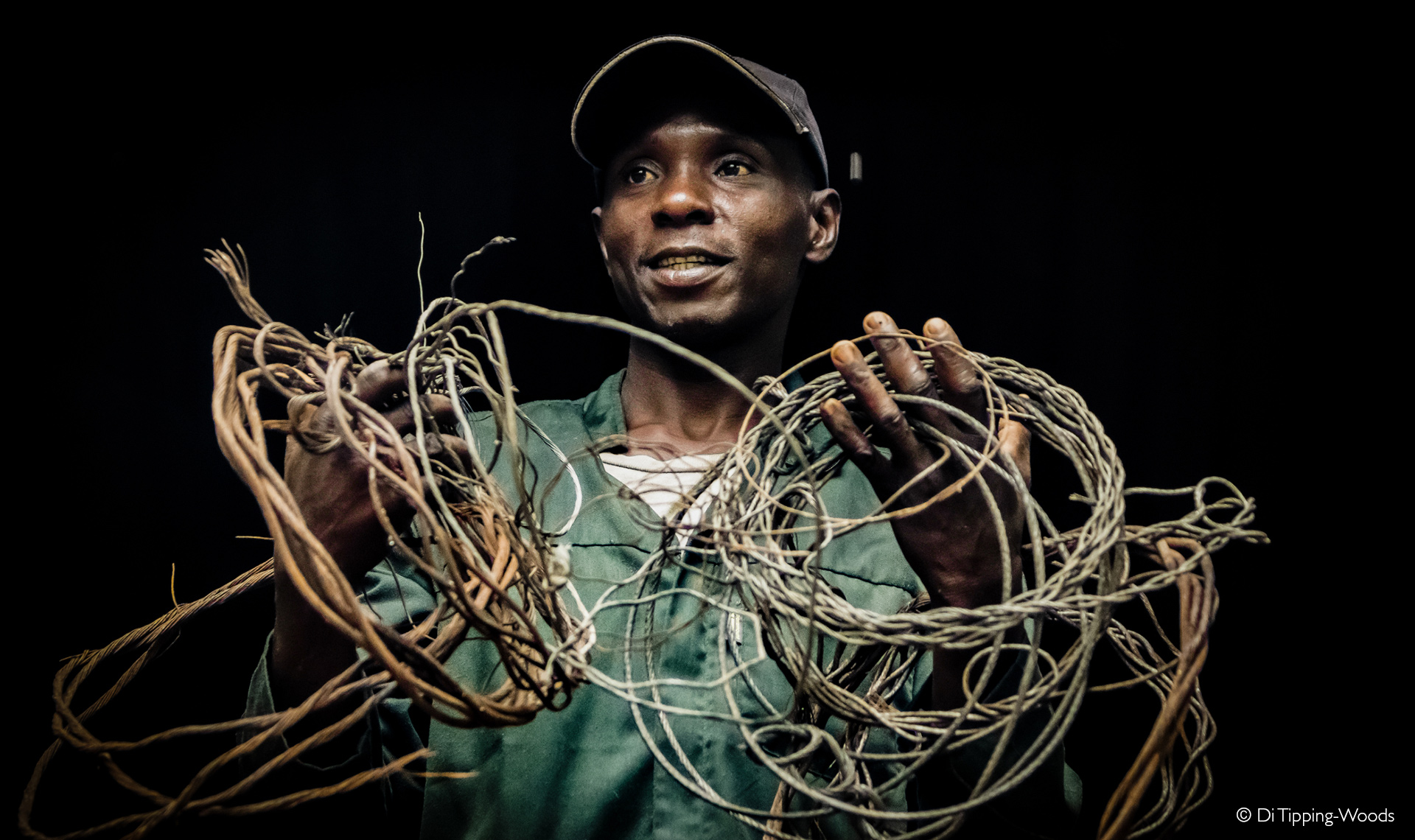
There is still hope that promised jobs and projects will materialise, as “the only way to take the pressure off natural resources is to create the food security and job opportunities for people,” says Stanton. But he also repeats the refrain from everyone in the tourism supply chain: “if the last two years have taught us anything, it’s that we can’t rely on one thing. We must all do something else.”
In rural areas, though, there aren’t many options. “2020 introduced a far worse scenario [than we have faced before] when balancing the needs for conservation and the expectations of communities,” said Jonga. Speaking of CAMPFIRE’s aims, he says, “we’re looking at initiatives within this and other communities that have the potential to create incomes linked to markets. This hasn’t been sufficiently pursued because we need extra resources to get these projects going. Given the lack of tourism, the gestation period for these projects becomes too long. They cannot evolve independently from the very minimal income currently being generated.”
Hunger looming
In Zimbabwe, nearly every survey respondent reiterated the dire need for financial assistance for staff salaries, anti-poaching units, and infrastructure rehabilitation for enterprises and communities. The most urgently requested support was equipment, from uniforms for game scouts to solar boreholes and irrigation infrastructure to improve water access. This information has been captured in a summary report, shared publicly via the platform. The African Nature Based Tourism platform’s next step is to match resilience-building activities with funding options. In some cases, funders may want to use the platform’s data; in other cases, the platform team might work from beginning to end with beneficiaries to develop proposals and get them funded.
In Sidinda, with hunger looming, people focus on surviving the dry season, meaning irrigation schemes for crops are top of mind for many. According to the United Nations, agricultural activities provide food and income for 60-70% of the population of Zimbabwe (UN, 2021), making it ideal as a business that complements tourism. However, most African Nature-Based Tourism Platform surveyed enterprises are found in Zimbabwe’s arid and semi-arid regions and need irrigation to grow crops successfully. Despite one of Africa’s mightiest rivers running through its heart, the Sidinda area is dry for months of the year, even when the rains are good.
A few kilometres from the conservancy gate, the Shoko family lives adjacent to a shared field. A borehole sunk by the conservancy with a solar-powered pump briefly changed their lives. Villagers were able to grow vegetables like butternut, tomatoes, and onions. Some produce was sold to a business in Victoria Falls that processed sun-dried tomatoes, some were sold in the community to supplement diets, some were sold to the fishing lodge to feed guests, and some were consumed directly by the growers.
The pump broke, though, and the community is desperate to fix it, but neither they nor the conservancy has the money. Meanwhile, the field is overgrown, and the crops wilted. “We’ve failed to grow anything this season because there is no water. We are worried about food,” says Jeremiah Shoko, the 73-year-old pump keeper. He has some goats and a few chickens, which he can sell, but “we’re looking for projects to help us get money to feed our babies.”
Unlike the Shokos, farming cousins Mungala Ncube (49) and Makani Tshuma (57) have had a good growing season. They planted early and swapped drought-sensitive maize for more resilient sorghum and millet. Their husbands worked in the Zimbabwe tourism industry, and their crops represented crucial income for the last two years, but elephants have just raided one of their fields.
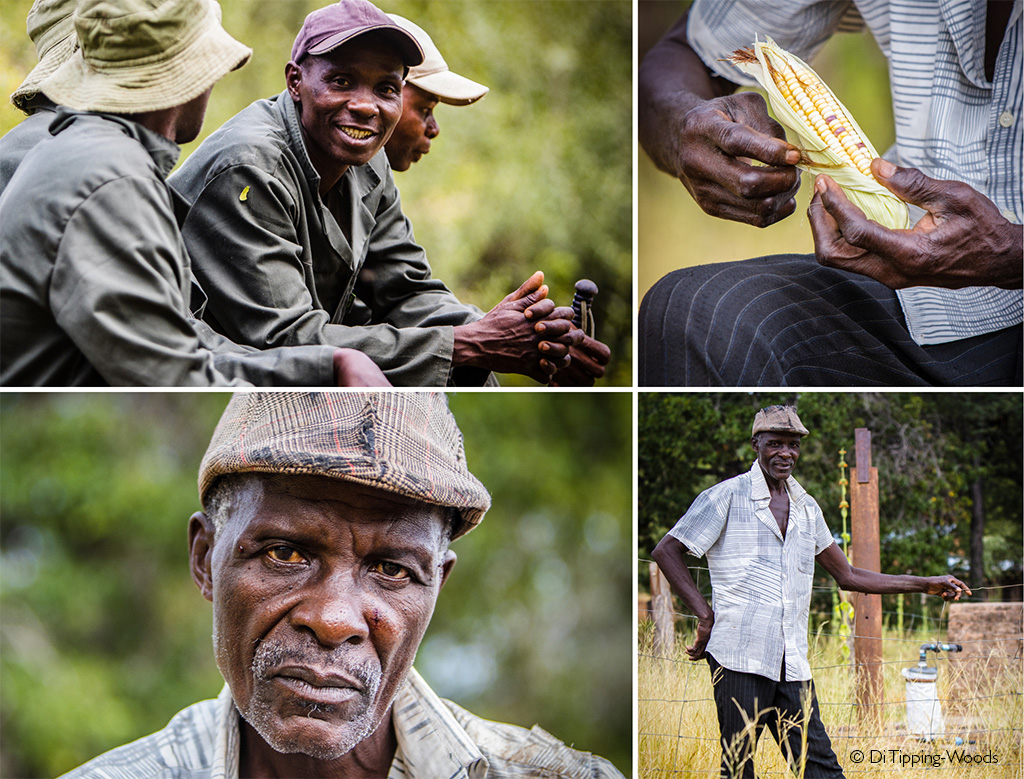
They are philosophical about the incident – “it could have been worse” – but believe that training and employing wildlife scouts from and in the community would help mitigate human-wildlife conflict and create much-needed jobs. “Next, we need money to grind what we have harvested,” said Ncube, adding that she hopes they will have enough to feed themselves and their families, plus a small surplus of nine or ten buckets to sell for school fees. They get US$5 for a twenty kilograms bucket of millet or sorghum. School fees cost US$45 per year per child.
“We need to promote rural development to make communities self-dependent,” says Hwange Rural District Council CEO Phindile Ncube. He says having strategies that provide some resilience, like nature-compatible activities that can be sustainably managed locally, is critical to people’s wellbeing. And while currently, COVID-19 is a huge stressor on an already stressed system, calamities can come in the guise of climate change, another pandemic, or political instability.
Building from the ground up
Small projects can have a significant impact in areas like this one in Zimbabwe, which is why the African Nature-Based Tourism Platform is looking for funding to help communities and small and medium enterprises recover from the pandemic and become more resilient to future shocks and stressors, says WWF’s Nikhil Advani, the project manager. The idea is not to replace tourism in Zimbabwe but to complement it because despite the hardships so many are facing, people are still optimistic about its potential.
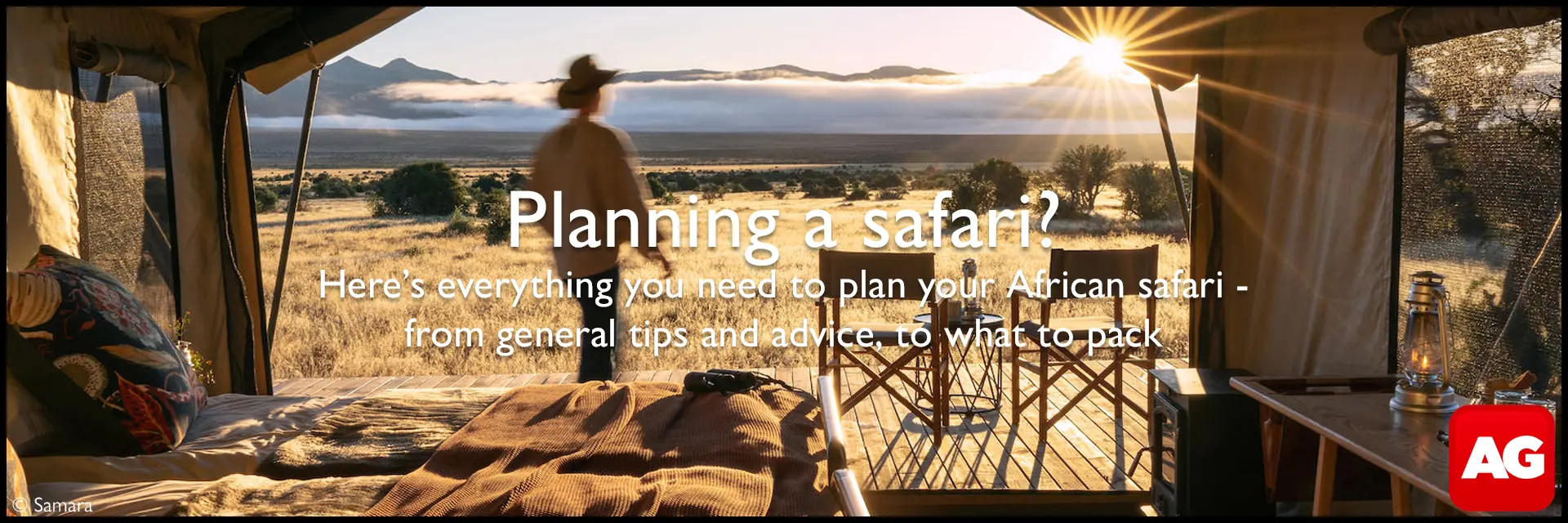
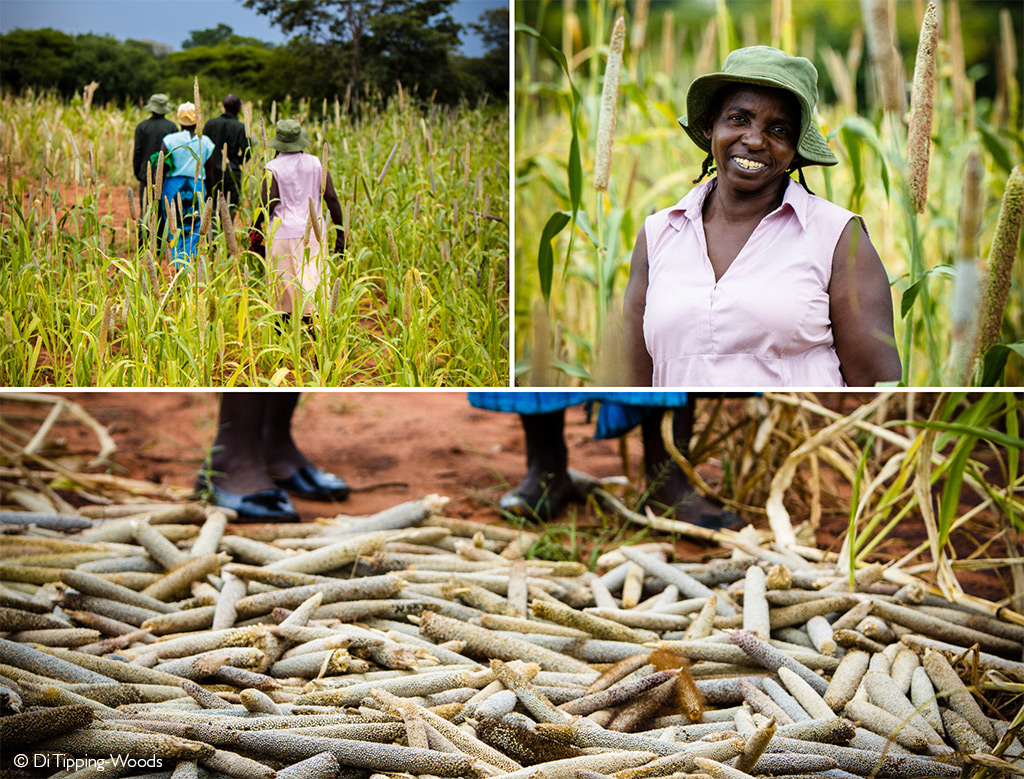
“There have been some new investments in tourism, even during the pandemic, especially in and around Victoria Falls,” notes Jonga. Just upstream from the Victoria Falls, in the Zambezi National Park, one such new development, Mpala Jena Zambezi River Camp, opened in December 2021. Head guide Blessed Mpofu is from Chisuma, fifteen kilometres below the falls, on the road to Sidinda. Camp Manager at Mpala Jena Rabbon Nyoni was raised in Victoria Falls, where many of his childhood role models worked in the safari industry. They explained how the money they earn at the lodge filters through to the villages where they grew up.
During the worst months of the pandemic, Mpofu was on half-pay and had to sell his Landcruiser to meet his financial obligations to his family. “From a rural boy, I had gotten somewhere in my life, so this was a huge step back. My dream has always been to start a guide school, and I’ve had to put that on hold. But I used the money from the sale of my Landcruiser to drill a borehole in Chisuma and start doing some farming,” he explains. He’s also gone ahead with a business plan and getting permission from the Hwange Rural District Council for his guide school. Like Tshuma, he has faith in better days to come. Until then, their cash flow is as vital a lifeline as the river itself.
Resources
Find out what you can do to help build back the tourism industry after COVID-19.
Read about the negative impact COVID-19 has had on conservation in Africa.
To comment on this story: Login (or sign up) to our app here - it's a troll-free safe place 🙂.![]()




